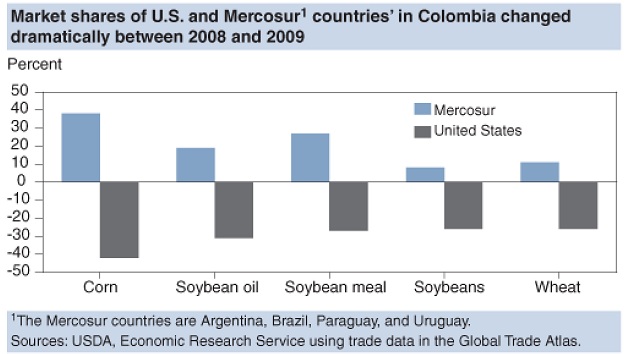Countries left out of FTAs lose out on trade
Proponents of the free trade agreements awaiting Congressional approval often argue their case by pointing to the boost FTAs will give to US exports. So, for instance, the US Department of Agriculture projects the US-Panama FTA would boost agricultural exports $46 million; the Colombian FTA, $370 million; and the South Korean FTA, $1.9 billion (see Trade Beef).
Now the latest issue of the USDA’s Amber Waves offers evidence that failure to enter into FTAs as the overall number of these agreements grows may be eroding the US presence in foreign markets.
Citing studies from the USDA Economic Research Service (ERS), the Amber Waves story notes that the upswing in trade among FTA partners “often” comes at the expense of trade with countries not party to the agreement.
Almost all countries are party to at least one of the 290 FTAs in force around the world. In 2009, about 54% of agricultural and 45% of non-ag trade was between FTA partners. US trade with its FTA partners represents a smaller share of the total: 41% of ag and 33% of non-ag trade in 2009.
Recently implemented agreements between the Association of Southeast Asian Nations (ASEAN) and Australia and New Zealand, and between ASEAN and China are expected to have limited impact on US trade.
In contrast, Colombia’s FTAs with the Mercosur countries have damaged US exports appreciably, resulting in a $305 million loss in corn and wheat exports in 2009. Read the full story (with links to the ERS studies) here.




